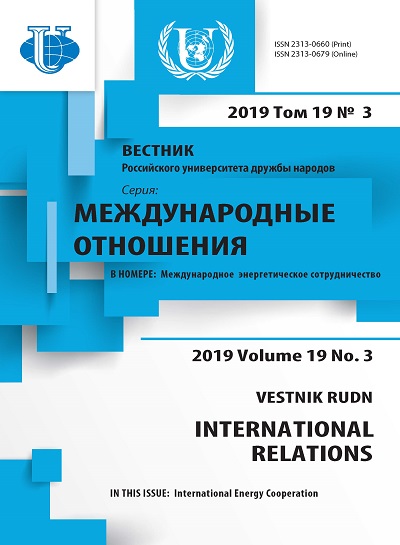Turkey and Greece: Political and Economic Relations within the Conflict Circumstances (1999-2017)
- Authors: Atrashkevich A.N.1
-
Affiliations:
- The Institute of Oriental Studies of the Russian Academy of Sciences
- Issue: Vol 19, No 4 (2019): Islamic Factor in World Politics
- Pages: 675-689
- Section: BILATERIAL RELATIONS
- URL: https://journals.rudn.ru/international-relations/article/view/22846
- DOI: https://doi.org/10.22363/2313-0660-2019-19-4-675-689
Cite item
Full Text
Abstract
The author distinguishes four stages of bilateral relations between Turkey and Greece in 1999-2017: 1) the “thaw” of 1999-2003; 2) the period of the growing cooperation with attempts to resolve the Cyprus issue in 2003-2009; 3) the next one encompassing 2009-2014, when efforts to build a contractual-cum-institutional basis for the expansion of relations took place: 4) and that of worsening the political relations in 2014-2017. After analyzing these phases, the author concludes that during the whole of study period, Ankara and Athens failed to improve their bilateral relations to the point of overcoming negative historical accounts and ethnic stereotypes. Despite the constant increase of the trade volume, at the political level there were a number of problems hindering the intensification of the bilateral dialogue. The main ones are the Cyprus issue and Turkey’s claims on the Greek continental shelf. The solution of these issues is obligatory for the further development of bilateral political relations as well as for the maintenance of the security in the region.
About the authors
Alexandra Nikolaevna Atrashkevich
The Institute of Oriental Studies of the Russian Academy of Sciences
Author for correspondence.
Email: alexandra.atra13@gmail.com
graduate student
Moscow, Russian FederationReferences
- Aksu, F. (2018). Confidence Building, Negotiation and Economic Cooperation Efforts in Turkish-Greek Relations (1990—2004). Turkish Review of Balkan Studies, 31—109. URL: http://www.turkishgreek.org/yayinlar/makaleler/ makaleler-1/item/120-confidence-building-negotiation-and-economic-cooperation-efforts-in-turkish-greek-relations (accessed: 25.09.2018).
- Bahcheli, T. (1997). Cyprus in the Post-Cold War Era: Moving Toward a Settlement? In: Bahcheli, T., Couloumbis, T.A., Carley, P. Greek-Turkish Relations and U.S. Foreign Policy. Cyprus, the Aegean, and Regional Stability. United States Institute of Peace. URL: https://www.usip.org/sites/default/files/pwks17.pdf (accessed: 10.01.2019).
- Bitzenis, A., Makedos, I. & Kontakos, P. (2014). The Presence of Greek Multinational Enterprises in Southeastern Europe: the Influence of Shadow Economy and Corruption in the Investment Expansion of Greek Multinationals. URL: https://www.researchgate.net/publication/319932948_The_presence_of_the_Greek_Multinational_Enterprises_in_SouthEastern_Europe_The_influence_of_shadow_economy_and_corruption_in_the_investment_expansion_of_Greek_ multinationals (accessed: 15.01.2019).
- Chadjipadelis, T. & Andreadis, I. (2007). Analysis of the Cyprus Referendum on the Annan plan. URL: http://www.polres.gr/ en/sites/default/files/PSA2007.pdf (accessed: 20.01.2019).
- Evin, A.O. (2004). Changing Greek Perspectives on Turkey: An Assessment of the post-Earthquake Rapprochement. Turkish Studies, 5, 1, 4—20. doi: 10.1080/14683849.2004.9687239
- Fisher, R. & Yury, W.L. (1992). Getting to Yes: Negotiating Agreement without Giving in. Moscow: Nauka publ. (in Russian).
- Gkouzelos, D. & Konstantopoulos, D. (2010). Ellinotoukikes oikonomikes scheseis apo ton v pankosmio polemo. Tei Kavalas scholi dioikisis kai oikonomias [Greek-Turkish Economic Relations after the World War. Technological Educational Institute of Kavala]. URL: http://digilib.teiemt.gr/jspui/bitstream/123456789/1861/1/022010196.pdf (accessed: 14.10.2019). (In Greek).
- Guida, M. (2008). The Sèvres Syndrome and “Komplo” Theories in the Islamist and Secular Press. Turkish Studies, 9, 1, 37—52. doi: 10.1080/14683840701813994
- Halbwachs, M. (2005). Historical Memory and Collective Memory. Emergency Store, 2—3, 8—27. (In Russian).
- Heraclides, A. (2011). The Essence of the Greek-Turkish Rivalry: National Narrative and Identity. GreeSe Paper, 51. Hellenic Observatory Papers on Greece and Southeast Europe. URL: http://eprints.lse.ac.uk/45693/1/GreeSE%20No51.pdf (accessed: 10.01.2018).
- Keridis, D. (1999). Political Culture and Foreign Policy: Greek-Turkish Relations in the Era of European Integration and Globalization. A NATO Fellowship Final Report. Cambridge. URL: https://www.nato.int/acad/fellow/97-99/keridis.pdf (accessed: 05.10.2018).
- Kontakos, P. (2010). Greek Direct Investments in Turkey: the Past Decade and the Future. In: 5th Biennial Hellenic Observatory PhD Symposium on Contemporary Greece & Cyprus, London School of Economics (LSE), London. URL: https://www.researchgate.net/publication/319213085_Greek_Direct_Investments_in_Turkey_the_past_decade_ and_the_future (accessed: 10.06.2019).
- Lubotskaya, A.S. (2015). Features of Contemporary Greek—Turkish Relations. National Strategy Issue, 1 (28), 24—39. (In Russian).
- Pitsoulis, A. (2010). Vertreibung und Diplomatie: Hintergruende und Umdeutungen des griechisch-türkischen «Bevoelkerungsaustauschs» von 1923. IMIS-Beiträge, 36. Osnabrück: IMIS, 2010. URL: https://www.imis.uni-osnabrueck.de/ fileadmin/4_Publikationen/PDFs/imis36.pdf (accessed: 19.01.2019). (In German).
- Potzhveriya, B.M. (1976). Turkey’s Foreign Policy after the World War II. Moscow: Nauka publ. (In Russian).
- Reuter, J. (1999). Reshaping Greek—Turkish Relations: Developments before and after the EU-summit in Helsinki. Hellenic Foundation for European and Foreign Policy (ELIAMEP). URL: https://www.files.ethz.ch/isn/23223/ Reshaping%20Greek-Turkish%20Relations.pdf (accessed: 15.01.2019).
- Rumelili, B. (2004). The European Union’s Impact on the Greek—Turkish Conflict // Working Papers Series in EU Border Conflicts Studies. Bogazici University, University of Birmingham. URL: http://www.birmingham.ac.uk/Documents/ college-social-sciences/government-society/polsis/research/2006/eu-border-conflict/wp06-eu-impact-on-the-greekturkish-conflict.pdf (accessed: 12.01.2019).
- Shahin, E. (2016). The Cyprus Issue in the Negotiations on Turkey’s Accession to the European Union (1990s — early 21st Century): PhD thesis. (In Russian).
- Theodoropoulos, B. (1990). Griechenland und Griechentum Gedanken zur Gestaltung der griechischen Außenpolitik. In: Hänsel, B. (Eds.). Die Entwicklung Griechenlands und die deutsch-griechischen Beziehungen im 19. und 20. Jahrhundert. S. 113—122. München: Südosteuropa-Ges. URL: https://digi20.digitale-sammlungen.de/de/fs2/object/display/ bsb00055622_00002.html?prox=true&phone=true&context=“Griechenland+und+Griechentum+“&ngram=true&hl= scan&fulltext=“Griechenland+und+Griechentum+“&mode=simple (accessed: 17.01.2019). (In German).
- Ulunyan, A.A. (1998). Political History of Modern Greece (End of 8th Century — 1990s). Lecture course. Moscow: IVI RAN publ.
- Yazgan, N. (2016). Politics of Interdependence: An Analysis of Turkish-Greek Economic Relations. Department of International Relations. URL: http://repository.bilkent.edu.tr/bitstream/handle/11693/29166/10112152.pdf?sequence= 1&isAllowed=y (accessed: 18.09.2018).











